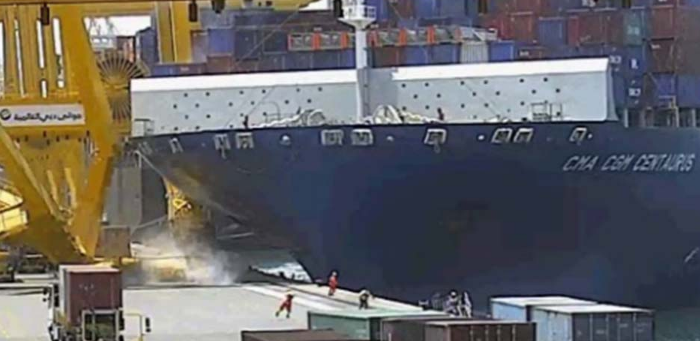The UK MAIB issued an investigation report on the allision of the UK-registered container ship ‘CMA CGM Centaurus’ with the quay that resulted in collapse of a shore crane and subsequent injury of 10 persons. MAIB noted that many of the factors in this accident can be attributed to the lack of compliance with the principles of Bridge Resource Management and to a focus on completing acts of pilotage as quickly as possible.
The incident
At 1137 on 4 May 2017, the ‘CMA CGM Centaurus’ made heavy contact with the quay and two shore cranes while under pilotage during its arrival at Jebel Ali, United Arab Emirates. The accident resulted in the collapse of a shore crane and 10 injuries, including one serious injury, to shore personnel.
Findings
- The accident occurred because the ship was unable to attain a sufficiently high rate of turn into a basin in preparation for berthing. The pilot was unaware of the ship’s speed, and the ship’s bridge team were uncertain of the maximum speed required to complete the turn safely.
- There was no agreed plan for the intended manoeuvre, and therefore no shared mental model between the bridge team and the pilot. Consequently, the pilot was operating in isolation without the support of the bridge team, allowing the pilot’s decision-making to become a single system point of failure.
- The pilot’s performance was focused on efficiency, which influenced his decision to turn the ship into the basin without ensuring that the manoeuvre was conducted at a sufficiently slow speed to enable its safe completion.
Safety issues
- The master/pilot exchange carried out on CMA CGM Centaurus lacked structure and detail. There was little further detail as the approach proceeded. By not actively engaging with the bridge team, the pilot effectively signaled that he did not need their assistance. The bridge team and the pilot did not have a shared mental model for the intended manoeuvre.
- By not requiring its newly recruited pilots to undertake BRM-P training, Jebel Ali port authority missed the opportunity to both emphasise its commitment to the effective integration of its pilots with bridge teams, and ensure its pilots were trained/refreshed in the principles of BRM. Despite extensive industry guidance, there continues to be a reluctance by masters and pilots to work together in accordance with the principles of BRM.
- Many of the factors in this accident can be attributed to a focus on completing acts of pilotage as quickly as possible. The priorities set at senior management level have a significant impact on the safety culture of a port, and there is a need to recognise that time-pressure, in the quest for terminal efficiency or financial reward, can have a negative effect.
Recommendations
After the investigation, the UK MAIB advised:
- DP World UAE region to review and improve its management of pilotage and berthing operations in respect of large container ship movements within the port of Jebel Ali.
- The International Chamber of Shipping, the International Maritime Pilots’ Association and the International Harbour Masters’ Association to promote the benefits of adhering to effective bridge resource management procedures during acts of pilotage and to endorse the Bridge Resource Management training for pilots course as an effective means of achieving this.
Explore more herebelow:


































































